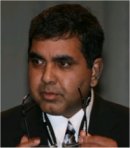|
Plenary Lecture
Design of Foundation Structures using the
Mechanics of Unsaturated Soils

Professor Sai K. Vanapalli
Co-author: Won T. Oh
Civil Engineering Department
University of Ottawa, ON
Canada
E-mail:
Sai.Vanapalli@uottawa.ca
Abstract:
Bearing capacity and settlement behavior are two key
properties required in the design of foundations. In
conventional geotechnical engineering practice, the
bearing capacity of saturated soils are typically
analyzed using two different approaches; effective and
total stress approach using Terzaghi (1943) and Skempton
(1948) bearing capacity theory, respectively. In most
cases, the bearing capacity of unsaturated soils is also
interpreted using the effective stress approach
regardless of the type of soil (i.e., coarse- and
fine-grained soils), which is not rational. In addition,
the conventional theory for the estimation of immediate
settlement using the modulus of elasticity, E of
saturated soils cannot be extended for unsaturated soils
or compacted soils as they do not attain saturated
condition during their service period.
The mechanics of saturated soils are however employed in
practice due to the following two reasons: (i) extending
the approach used for saturated soils to soils that are
in a state of unsaturated condition provides
conservative analysis and (ii) there is no simple
framework to design geotechnical structures using the
mechanics of unsaturated soils.
In this paper, simple models are proposed for predicting
both the bearing capacity and the modulus of elasticity
of unsaturated soils for different types of soils. These
models use the Soil-Water Characteristic Curve (i.e.
SWCC), which is defined as the relationship between the
water content and soil suction, as a tool along with
saturated soil properties (i.e., bearing capacity and
modulus of elasticity under saturated condition).
Details of how the proposed models can be implemented
into geotechnical engineering practice and differences
associated with the proposed methods and conventional
methods are also discussed with practical examples.
Lastly, a method to estimate matric suction of
as-compacted soils using a pocket penetrometer is
described.
The simple techniques proposed in this paper should
encourage the geotechnical engineers to implement the
mechanics of unsaturated soils in practice.
Brief Biography of the Speaker:
Dr. Vanapalli is a Professor and Graduate Program
Coordinator of the Civil Engineering Department,
University of Ottawa. Dr. Vanapalli received his PhD
from the University of Saskatchewan in 1994. Since then,
he has been actively involved with research activities
related to mechanics of unsaturated soils including
expansive soils. The focus of his research was primarily
extended towards studying the mechanical behavior of
unsaturated soils and proposing simple techniques for
the estimation of the soil-water characteristic curve,
bearing capacity and settlement behavior of unsaturated
soils.
Dr. Vanapalli has authored or co-authored over 120
research publications in peer reviewed journals and
conference proceedings, a book chapter and three
state-of-the-art reports. He has also delivered three
Keynote addresses at the International Soil Mechanics
Conferences on topics related to the mechanics of
unsaturated soils.
Dr. Vanapalli has been a Co-Chair for the Diamond
Jubilee Canadian Geotechnical Conference held in Ottawa,
Canada in 2007, Co-Chair of the 12 IACMAG, Goa, India in
2008 and advisor for the 14th Pan-American Conference on
Soil Mechanics and Geotechnical Engineering Conference
to be held in Toronto, Canada in 2011. He has served as
Technical or Scientific Committee Member for several
national and international conferences. He has reviewed
publications for several technical journals that include
Geotechnique, Canadian Geotechnical Journal, Journal of
Geotechnical and Geo-environmental Engineering, American
Society of Testing Materials, Soil Science Society of
America and Transportation Research Board.
Dr. Vanapalli has been nominated by the Civil
Engineering Department and the Faculty of Engineering,
University of Ottawa for the OCUFA Teaching Excellence
Award (2007); University of Ottawa Award for Excellence
in Teaching (2006); Civil Engineering Department for the
John V. Marsh Teaching Excellence Award (2006). In
addition, fifteen students of Dr. Vanapalli over the
last 8 years have received national honors by the
Canadian Geotechnical Society and other organizations
for submitting best undergraduate (individual and group
thesis) and graduate student papers.
Dr. Vanapalli is a volunteer for several activities of
Canadian Geotechnical Society, Professional Engineers of
Ontario and TC6 of the International Society of Soil
Mechanics and Geotechnical Engineering which is
responsible for promoting cooperation and exchange of
knowledge in the area of mechanics of unsaturated Soils.
|